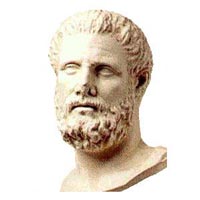
| Born: c.460 BC at Kos, Ancient Greece |
| Died: c.370 BC at Larissa, Ancient Greece |
Hippocrates was an ancient Greek physician who was born around 460 BC on Cos, an Aegean island. Many consider him to be the “father of medicine” because he transformed the path of Greek medicine. He believed that diseases were caused by some type of natural action instead of being caused by the spirits or gods.
His Early Life
Hippocrates was the son of Praxithea and Heracleides. His family’s wealth allowed him to receive a very good education when he was child. After studying nine years of reading, spelling, writing, physical education, poetry, singing, and music, he attended two years of secondary school.
Hippocrates likely studied medicine under his father. He observed not only his father, but also another physician, Herodicos, on how they treated patients. His training may have included trips to the Greek mainland and quite possibly to Libya and Egypt to learn other medical practices.
Later Work
Hippocrates was given credit for healing many, such as Macedonia’s king, whom he had treated for tuberculosis. His dedication to healing was tested when he fought the plague in Athens for three years from 430-427 BC. The peak of his career occurred during the time of the Peloponnesian War (431-404 BC).
Later, Hippocrates taught medicine to his own sons, Draco and Thessalus. The physician and teacher role blended well when Hippocrates started a school for medicine in Cos around 400 BC. One of the main things that he taught was that it was important to keep a record of the patient’s condition and symptoms.
The Hippocratic Corpus
A body of writing that has been attributed to Hippocrates is the Hippocratic Corpus, a collection of medical books. It contains 70 books and they are considered to be the oldest known books about medicine. Each subject matter was written for a particular reader or student. Some books were written for physicians and some for pharmacists while others were written for the layman.
This ancient Greek doctor recommended diet and physical exercise as remedies or cures for ailments. However, he pointed out that some individuals who could not or would not follow these recommendations would most likely need some type of medicine. His writings also taught that physical handling may cure physical troubles, such as a dislocated shoulder, where the physician could position it back into place.
The Hippocratic Oath
The Hippocratic Oath is a document on medical practice ethics and morals. It was credited to Hippocrates, although new information indicates it could have been authored after he died. This is believed by many to be the most famous document of the Hippocratic Corpus.
Even though the Hippocratic Oath today is not often applied in its original form, it is still the foundation for many other oaths or laws that outline what the good practice and morals of medicine should be. These oaths are commonly taken by today’s medical graduates.
The Death of Hippocrates
Very little is known about the death of Hippocrates apart from different possible years in which he may have died. A variety of sources state it was 377 BC, but others disagree. Regardless, his contribution to the medical world still endures in modern medicine around the world.